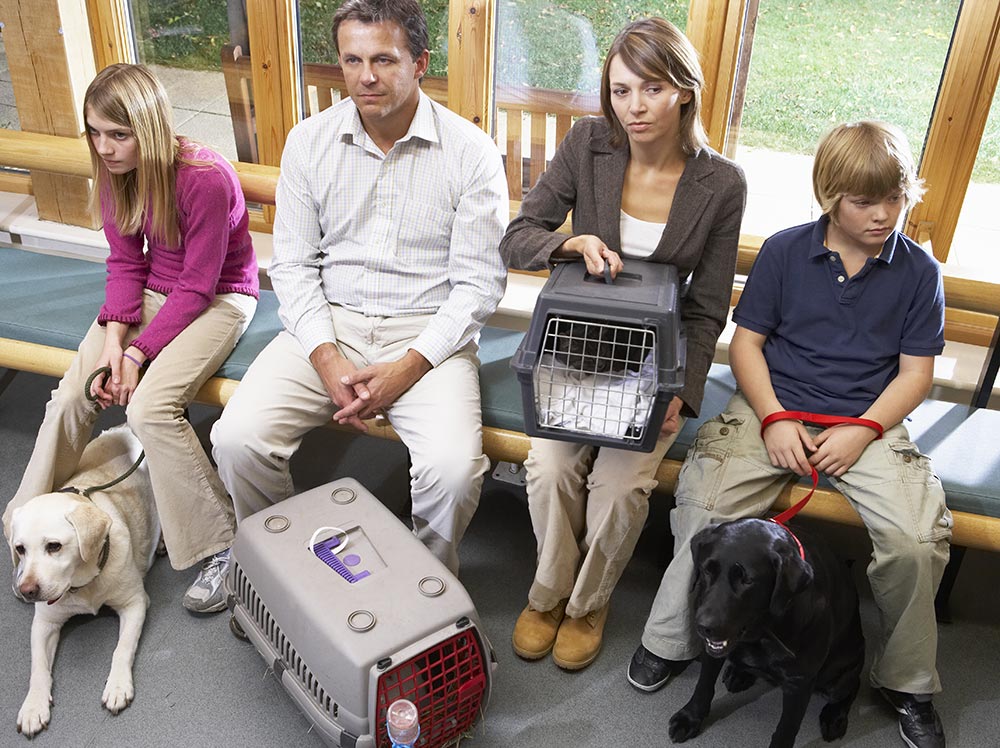I nearly didn’t go…
I was locuming at the time and been away from home a lot. I’d also been working nights – the first time I had tried solely out-of-hours work – and it had been punishing. Why, then, was I coming to shadow a pathologist for a day in a veterinary laboratory?
When I had enquired, I’d been interested in exploring other avenues, seeing what else my veterinary degree could achieve. But the day was here, I was tired and I wanted to see my family.
Did I seriously think I wanted an office job?
It is now, unbelievably, three years later and I’m about the enter the fourth year of my residency in clinical pathology. I did the odd stint of locuming at first, but for the last two years I’ve been solely working in an office.
With great power…
I remember sitting next to the pathologist on the day I shadowed with him – and marvelling. I marvelled that I was in an environment where knowledge was important: it really meant something, was respected and had power.
I marvelled that there was a way to make a living solving puzzles – I knew behind each piece of paper, each case and each set of slides we looked at there was a worried owner and difficulties and messiness, but it was abstracted – almost peaceful (so long as we didn’t look at the huge pile of looming cases).
I marvelled that people could make it through the day without getting covered in bodily fluids and, most of all, I marvelled that there was a way to work that didn’t carry the risk of someone rushing in to the room, shouting hysterically and carrying a beloved friend, bleeding from a dozen different wounds, vomiting blood or seizuring – or dozens of other ways to drag the day into chaos.
Same old, same old

After all those years in practice, what surprised me as much as all the differences were the similarities.
I must have known it on some level, but it turns out every workplace has politics and gossip. The different ways of working I had encountered in my colleagues in practice were mirrored in my new colleagues:
- fast workers
- perfectionists
- the stressed
- the laid back
- the enthusiastic
- the cynical
Resentments and disagreements about working patterns bubbled under the surface just as they had in practice and colleagues pulled together under pressures of work on tough days, just as they had on the bad days in my previous life.
Something that hadn’t changed was the workload. Life as a clinical pathologist is every bit as busy as my life in general practice, perhaps even more so. Occasionally, I think back in wonder that I ever managed to take a lunch break longer than 45 minutes (sometimes 3 or 4 hours long) – and 10-hour days seem like an early finish nowadays.
Completely different
The differences are profound, of course. I have a job where it doesn’t actually matter if I’m a little late for work – I’m not going to have a queue of angry clients waiting for me, just a bigger pile of slides and blood forms. I’m still getting used to that idea, but it’s certainly more conducive to the unpredictability of a young family.
I spend my days mostly sitting down now… instead of hoping to get a quick nap at lunch, I now find my body yearning for exercise, and I spend as much of my lunch time as I can on the move so my legs don’t seize up.
I’ve swapped back problems from lifting heavy patients for neck problems from craning down a microscope, and I’ve started to Google the dread phrase “repetitive strain injury”.
Stress levels
The biggest difference of all, though, is the difference in stress. It’s not that there isn’t stress as a clinical pathologist – I find it a mentally challenging job (more so than practice), and I understand these marvellous bags of flesh and fluid we inhabit far better now than I ever did before.
In many ways, a job that requires a deeper level of understanding and thought is exciting and rewarding, but it doesn’t always feel that way at 7:30pm when that pile of cytology still looms stubbornly on the desk.
The mental stress is high, if not higher, than in practice. The physical stress is different, but present – I’m surprised to find I’m sorer after sitting down all day than I ever felt before.
Here’s the main difference though – the big one, and the reason why I’m unlikely to head back to practice any time soon – the emotional stress is largely absent from my current job.
Nothing compares

There’s nothing I’ve experienced as a clinical pathologist that can compare with the way you feel when things go wrong in practice. We make mistakes, of course, and they have consequences, but the feeling of abject horror, self-loathing, blackness and wanting to escape that descends when you’re faced with a patient that died because of you, has no equal in my current office job.
I no longer have to end life as part of my job, I don’t have to console people in the worst moments of their lives and I simply don’t suffer anything comparable to the emotional blackmail clients consciously, or unconsciously, use on you in practice: “Don’t you even care about animals?”, “All you lot are interested in is making money”.
Emotional toll
Lots of jobs have long hours, are mentally taxing and are riddled with politics, infighting and gossip, but I suggest very few jobs are emotional taxing in the way veterinary general practice routinely is. I think that’s the reason a lot of us find it hard and why many leave the career. I think, although I may be wrong, it’s also a big part of the reason our profession has such a high suicide rate.
I never received any training about the exceptional emotional stress that practice places upon us, or even any acknowledgement of it. I feel, very strongly, this stress needs to be understood, and shared, so practitioners don’t suffer in the way that so many of us have.
Things are changing, this is a good thing. Let’s keep working and sharing our feelings so it continues that way.

Leave a Reply